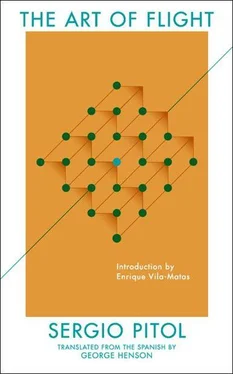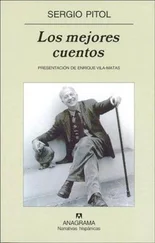Sergio Pitol - The Art of Flight
Здесь есть возможность читать онлайн «Sergio Pitol - The Art of Flight» весь текст электронной книги совершенно бесплатно (целиком полную версию без сокращений). В некоторых случаях можно слушать аудио, скачать через торрент в формате fb2 и присутствует краткое содержание. Год выпуска: 2015, Издательство: Deep Vellum, Жанр: Современная проза, на английском языке. Описание произведения, (предисловие) а так же отзывы посетителей доступны на портале библиотеки ЛибКат.
- Название:The Art of Flight
- Автор:
- Издательство:Deep Vellum
- Жанр:
- Год:2015
- ISBN:нет данных
- Рейтинг книги:5 / 5. Голосов: 1
-
Избранное:Добавить в избранное
- Отзывы:
-
Ваша оценка:
- 100
- 1
- 2
- 3
- 4
- 5
The Art of Flight: краткое содержание, описание и аннотация
Предлагаем к чтению аннотацию, описание, краткое содержание или предисловие (зависит от того, что написал сам автор книги «The Art of Flight»). Если вы не нашли необходимую информацию о книге — напишите в комментариях, мы постараемся отыскать её.
The first work in Pitol's "Trilogy of Memory," The Art of Flight imaginatively blends the genres of fiction and memoir in a Borgesian swirl of contemplation and mystery, expanding our understanding and appreciation of what literature can be and what it can do.
The Art of Flight — читать онлайн бесплатно полную книгу (весь текст) целиком
Ниже представлен текст книги, разбитый по страницам. Система сохранения места последней прочитанной страницы, позволяет с удобством читать онлайн бесплатно книгу «The Art of Flight», без необходимости каждый раз заново искать на чём Вы остановились. Поставьте закладку, и сможете в любой момент перейти на страницу, на которой закончили чтение.
Интервал:
Закладка:
Four adolescents from the village of Cloyes march toward Jerusalem to deliver the Holy Sepulcher from the hands of the infidels: Maud, the daughter of a blacksmith; Robert, the miller’s son; Blanche, the daughter of a carpenter; and Jacques, a shepherd who does not know who his parents are. Accompanying them is Alexis Melissen, a Byzantine Greek, Count of Chartres and Blois, titles he inherited from his late adoptive father. Everything begins when the shepherd Jacques ventures down to the village square one night, as if suffering hallucinations, and interrupts a feast with these words:
“The Lord God Almighty has revealed to me that because of the blindness and cowardice of kings, princes and knights, it is fitting that the children of Christ should go, for the love of God, unto the relief of the city of Jerusalem that is fallen into the hands of the infidel Turk, God the all-powerful has chosen ye, for the confident faith and innocence of children, greater than all the powers on land and sea, are able to accomplish the most holy miracles, therefore possess your hearts with pity, for the Holy Land and for the desolate sepulchre and tomb of Jesus…” 27
In The Children’s Crusade Schwob presents in succession the children’s monologues, as well as those of some characters who participated in this unprecedented enterprise. Andrzejewski, on the other hand, strives for simultaneity. In the endlessly interwoven opening sentence, the author integrates the stories of the four crusaders from Cloyes with that of Alexis Melissen, who voluntarily joins the group of modest artisans who heed the divine call. The exercise of confession sets the tale in motion. A unique receptacle has been created into which the information extracted from their confessions, as well as the self-confession of the old priest, flows and is collected. The call to the crusade is submerged in a complex tapestry of passions: loves of gleaming purity alongside others born of bloodshed, nourished by it, hidden beneath ominous burdens. Every character, both chaste and lascivious, has learned that suffering is the shadow of all love, that love divides into love and suffering, and that this will be one of the musical lines that will run throughout the book. The words of each of the children are echoed by those of the others; each confession modifies, expands, or clarifies those of their companions. A system of constant reiterations links the diverse monologues in the mind of the confessor, which provides the illusion of simultaneity. The long-awaited multum in parvo of the epigrammatic poets is achieved here through excess, fragmentation, and verbal interaction.
The novel begins with a cruel dream, filled with horrors and terrifying omens. The old priest dreams of two adolescents who move with great difficulty through an implacable desert. One of them falls prostrate on the sand; before dying, his moribund lips emit an exhortation to the other to continue the journey until he reaches Jerusalem’s immense Gates of Paradise and carry out the magnificent task that has been entrusted to him: the liberation of the Sepulcher of Christ. The other, even weaker and more defenseless, continues the march at a faltering pace, feeling the empty air with his hands, as if he were about to touch with them, the long-awaited walls. Suddenly, he turns his face toward the priest and sees his empty eyes, eyes that will never behold the towers or the walls of the holy city. At that moment, the priest discovers with horror that the martyred face is that of the enlightened leader Jacques de Cloyes. The revelation terrifies him. It is necessary to find the source of the evil dream to understand its meaning. He decides to undertake a general confession, to probe the children’s souls, to discover whether one harbors a dark sin, and, of course, to absolve it. At the end of the third day the general confession will end with that of the five children of Cloyes, the first to begin the march. The priest is determined to forgive everything. Nothing will stop the crusade. His long life as confessor has taught him that the desire for faith can also be born from suffering, misfortune, and destruction, and that the same poisoned sources are capable of generating a miracle. And that miracle can be none other than the rescue of the Sepulcher of Christ. He will be present at the supreme moment. He senses that his death is near, but that death will attain a greatness that his life has never known. Assisting in the mission undertaken by the children, entering with them into Jerusalem, prostrate at the finally-liberated tomb of the Lord, will endow his existence with the highest meaning to which it is possible to aspire.
As the confession progresses a moral conflict begins to loom, which the author was unable to do without and which functions as the strongest pillar of the story; without that ethical reflection the novel would still be amazing, but would run the risk of suffering from a decorative and archaeological saturation, as is the case with Flaubert’s Salammbô , which would be entirely foreign to his intentions. Those battles between instinct, faith, and reason that Andrzejewski considered essential in the work of Dostoevsky are also present in his account and confer on them a modernity that could render incidental the fact that the action transpires in the early twelfth century.
“It’s no use,” Alexis Melissen confesses, attributing these thoughts to his adopted father, “all is vain apart from shame and prejudice, the satisfaction of the senses does not still desire and lust, for as soon as one desire is satisfied a hundred others awaken even more imperiously actions born of the purest desires end in remorse and infamy and perhaps there are no pure desires, the need for violence and cruelty takes possession of man’s nature, he flees from it in a trembling and shame-filled solitude, then, drawn back once more into the ravening pack, driven by folly and the furies of physical strength, again he goes murdering and violating right and left until the moment of awakening arrives and then man finds himself once more alone in his solitude but because of the criminal gravity of his folly even more solitary than before and in that absolute solitude, in the prison of his flesh and spirit, he searches desperately and in vain for some way out, but there is no way out, he snatches blindly and vainly at what appear to be promises of salvation, but he can forget himself only in violence, a violence bereft of illusions, naked and black as hatred…”
The fatality with which man is drawn to crime, as if it were his only possible destiny, finds in that abstract struggle (like that contained in the mystery plays) the grace, the redemption, or the reason to save him. The search for good is as present in man as his instinct toward evil. The confessor knows this well: “No man could be evil all this life, and it can happen that when he has lost all hopes and all illusions a man kills this man in him and voluntarily takes his own life in a second of time and yet still goes on living, but in order to kill within him the need for love and the need for hope he has to live through many long, painful years, like a drowning man grasping at air, seizing a handful of water, now when the man in him is still not entirely dead and still walks the somber haunts of evil, if there be even the feeblest glimmer of good, of yearning for good in him, the man will crouch over that little wavering flame in order to delude himself in moments of solitude that what he sees there then, uncertain and weak, could still, with a favorable wind, be transformed into an immense blaze.”
The ending is terrible. The last confessant, Jacques de Cloyes, who was thought to be illuminated by the grace of God, cannot be absolved. What the child believes to be an illumination in fact is not. The confessor understands that he must stop the march of madness, of innocence, of passions, and of lies. He also understands that his initial dream, that of a blind youth with hands groping the air while another dies in the desert was a premonition; that if he does not stop the thousands of children, they will perish along the way, and that he, poor and old, will not be granted the grace to reach Jerusalem with them, that he will not be witness to the liberation of the Holy Sepulcher. He stops and cries out in the middle of the night in an attempt to stop the children, but to no avail. Plunged into darkness, strengthened by their chants, the children will continue the march. Their voices will drown the words of the only man who has managed to understand the reason. And the heavy arm of a cross will knock him down, and the children will pass over his dying body as over a mere rough spot on the ground, and one after another will walk on him until his entire body is sunken into the mire.
Читать дальшеИнтервал:
Закладка:
Похожие книги на «The Art of Flight»
Представляем Вашему вниманию похожие книги на «The Art of Flight» списком для выбора. Мы отобрали схожую по названию и смыслу литературу в надежде предоставить читателям больше вариантов отыскать новые, интересные, ещё непрочитанные произведения.
Обсуждение, отзывы о книге «The Art of Flight» и просто собственные мнения читателей. Оставьте ваши комментарии, напишите, что Вы думаете о произведении, его смысле или главных героях. Укажите что конкретно понравилось, а что нет, и почему Вы так считаете.












